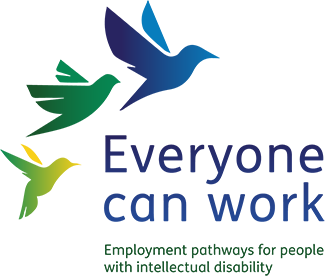View the video here: Film 1: Starting Early
Wade:
Wade, W-A-D-E and old is eight.
Speaker 2:
What do you want to be when you grow up?
Wade:
A cowboy.
Leticia:
My name’s Leticia and I’m Wade’s mum. I think planning early is really important. It means that you set out how you intend to go on. You can start by taking a big goal as far as living independently, having a job in the future and just break it up into tiny little steps from when they’re a baby.
Leticia:
The idea of making your own meal can start when they’re a baby, by making choices between which spoon they’re going to use and pointing out where the bowl is. If you plan ahead, you’ve got a path that you can go down and you’ve got a vision at the end. And if I keep that path open and I keep the opportunities open for him, there’s no saying that he couldn’t end up being a cowboy or a police officer or whatever he wants to be.
Luke Nelson:
My name is Luke Nelson and I work at an organization called VALID. During my primary school years, I went to half and half, so a couple of days of mainstream and a couple of days at special. Special school, when I was there, it wasn’t that great, it was more like a daycare. I walked out of school, well, wheeled out of school if you like, I couldn’t read and I couldn’t spell, which I sit back and go now, given the fact of what I do for work, I said to myself, “Well, how is that possible given the fact that when I left school at 18, I could write my own name, but in terms of writing other things, it was illegible.”
Luke Nelson:
The main benefits of mainstream schooling for me were being able to interact with people without disabilities, but also being able to be not fearful that people with disabilities were the only people I could associate with.
Leticia:
Wade goes to a mainstream school, he’s fully included and he’s there full time. Funding for children with disabilities in schools is done by the schools and they will put in an application to the government to get funding, to include them in the school. That funding might be used for an aide in the classroom, it might be used for building ramps, it might be used for technology, resources, whatever it is relevant for that child.
Leticia:
The school’s been fantastic. He has a teacher’s aide in the classroom with him for times that he needs assistance to stay on task. And I chose mainstream school for him, because I want him to be around a diverse community, I want him to be around people with different abilities, I want him to be exposed to a broad world of ideas and I feel that a mainstream school reflects the society that he’s actually going to be living in and that is how he’s going to learn the best.
Luke Nelson:
Expectations of people with disabilities can be sometimes very low. If you don’t do things to encourage people to be independent, then they become dependent on people. When I was in Scouts, it really showed me that you can do a lot of things. I remember sleeping on concrete floors in sleeping bags and that’s what able-bodied people do too, so I was included in that society and what I do now, for work, I can go back in my life and go, “Well, Scouts was a big part of that.”
Leticia:
As far as jobs around the house goes, I try. The main things I’m really consistent with at the moment is just getting him to dress himself and to choose his clothes and to be independent when he needs, not always jumping in to do things for him, so giving him the opportunity to do them himself first and know that he can do them and that that is the expectation.
Leticia:
It’s really important that he learns to do things himself so that he doesn’t rely on other people. That means he’s got a greater level of independence, it means he’s got more options as far as living independently, having a job in the future, having that idea that he doesn’t have to wait for someone to come in and do things for him, he can make his own choices and he can make his own decisions and he’s got the confidence that he’s got the skills to do that as well.
Luke Nelson:
My advice to parents out there is, let them have the freedom to experiment. Let them make mistakes, I think, because if you don’t make mistakes, you’re never going to learn.
Leticia:
Firstly, presumed competence. You have to believe that your child is capable and if they’re not capable now, that they will be or they might be. Follow their passions and follow their interests and surround yourself with people who can help you achieve that. I also think talking about what you do in your life, what you do for jobs, what other people do for jobs, what is possible? Some people might say that I’m setting him up to fail, but I’m just opening lots and lots of doors for him and he will decide which ones he steps through.


